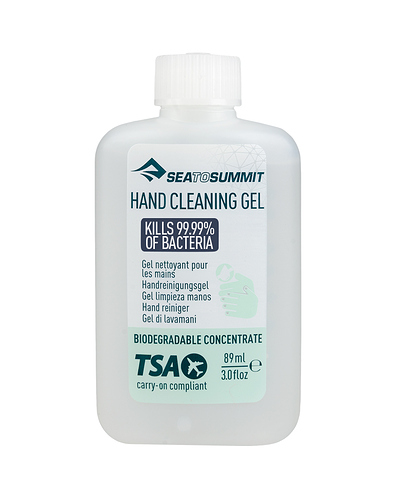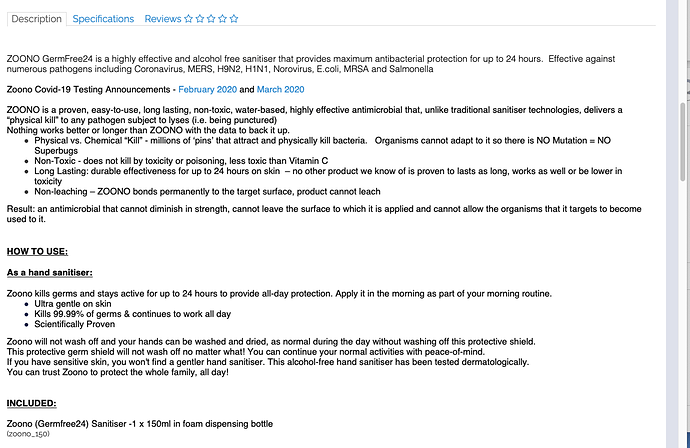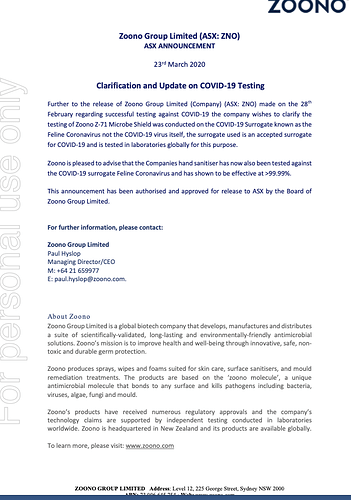We lab tested Mosaic brands hand sanitiser recently and found the stated alcohol content was incorrect. For brands not listing the alcohol content, they should still contain a high alcohol content to meet the product’s claims but we have more testing on the way to further inform the issue.
Aside from alcohol-based sanitisers there is a big issue that a lot of the liquid handwash products sold in supermarkets and pharmacies these days are not soap.
I contacted the COVID hotline some months ago about their handwashing instructions, which are not clear on what constitutes a viable handwash product as the non-soap products are not likely to contain the chemicals required to break down a virus’s lipid coat. They promised (by phone and by email) to get back to me, but I’ve not had any follow-up or seen any published modification of their guidelines.
A group that did respond to my questions was the (now NY Times-owned) Wirecutter group, who published this article: What Kind of Soap Kills the Coronavirus? | Wirecutter who did some research and wrote: here is one type of product, however, that she suggests steering clear of when you’re washing your hands:
“Don’t attempt to swap in “soap-free” skin cleansers, which may not be able to dissolve the virus’s lipid coating as soap can. Instead, stick to soap when you wash your hands.”
This is a matter of concern as I’ve seen some bulk sales in supermarkets like ALDI of handwash products which the rear label reveals are “soap-free”.
“Mosiac Brands hand sanitiser fails the lab test”.
And everything else regarding Mosiac Brands fails the pub test.
![]()
In the old job they used to walk around and tell us to use sanitizer… it was sticky, took ages for the stickiness to vanish… it was non alcoholic.
At home I now have gin based, when I am on the go left overs of the purell
If you’re concerned about the actual contents of a product - all manufacturers will hold an MSDS sheet and this will give you their stated Alcohol content.
Naturally it’s a bit of effort to call up companies to check, but hey.
We had a bottle of this from previous hiking adventures and have found its 70%+ alcohol content.
Dries quickly and doesn’t leave a slimy/sticky residue like others we’ve tried.
Welcome to the community, @2cents.
Perhaps vendors should be obliged to make those sheets available on their web sites. That would avoid having to call up and get the run-around.
Zoono makes hand sanitizers that are alcohol-free and nice to use as they are foam. And last 24 hrs. I see the company has released a statement about its effectiveness against coronavirus. Can Choice confirm as I am immune suppressed?
Does ‘24 Daily Instant Hand Sanitiser’, made by Pharmacy Brands Australia P.L. in Milton Queensland contain enough alcohol? Mine is sticky and does not burn well.
Peter Adamson
Post a post a link to that please as I can’t find it.
Could you please include Lifebasics by Nourished Life Antibacterial Hand Sanitiser in your test as they do not list the alcohol content of their product
That may be true, as long as you don’t touch anything and there are no aerosol or airborne particles which may come into contact with you.
If you wash your hands, will it last 24hrs? NO. You need to keep rewashing after each time your hands have been in contact with anything which may harbour germs. Hand sanatisers are no different.
From the ABC article below:
"The brand confirmed they had temporarily withdrawn the Air Clean Instant Hand Sanitiser from sale to undergo further testing, but disputed Choice’s claims that the alcohol level was “far below what would have been effective against COVID-19”.
The World Health Organization standard requires at least 80 per cent ethanol or 75 per cent isopropyl alcohol."
This page gives some details. The short story is that Zoono have evidence that their products are effective against a wide variety of microbes here. They have tested it against some coronaviruses. Regarding COVID19 they say:
Both our Microbe Shield Surface Sanitiser and Hand Sanitiser products were recently sent to a German laboratory for testing against the latest Chinese strain of the coronavirus (COVID-19). This strain of the coronavirus has not previously been available for testing. Given the successful test results in 2014 and since, Zoono is very confident that both products will achieve similar efficacy, as Zoono brands contain the same active technology. Results from testing against the current coronavirus strain are expected in the next four to six weeks.
They may well be right but we don’t know til the results come back.
As for the claim that it lasts 24 hours they say that has been established for some microbes but AFAI can see not COVID19. Once gain, they may be right that it works that long for COVID19.
I too am sceptical about such claims. Zoono says it has evidence that it is true of their quaternary ammonium compound based sanitiser, they say it binds to the skin and keeps working. I am looking for independent evaluation of such claims
Thanks for the link to the details.
Unfortunately there is a complete absence of detail about the testing process, so it is hard to know whether the study is valid in the first place, and if it is, is it possible to extrapolate from the stated results.
One immediate issue is that they apparently used feline coronavirus as a surrogate, but this is not readily accepted by the TGA as a surrogate to provide evidence; though it may be considered (https://www.tga.gov.au/surrogate-viruses-use-disinfectant-efficacy-tests-justify-claims-against-covid-19).
They have now sent it for testing against the real thing, so we wait.
Hi @Ithaka, welcome to the forum.
Hospitals use liquid handwashes for biological control/cleaning hands over cakes of soap. The reason I understand is they are very effective in stripping oils and skin contaminants which may harbour bacteria, fungi and viruses. When rinsing, the microbes are then readily washed from the skin. They also reduce cross contamination between cake soap users and surfaces cakes of soap touch.
Looking at some scientific papers about the common or main active ingredient of rhandwash is sodium/ammonia lauryl sulfate (SLS)…these are reported to denature or alter lipids which one would also expect to occur on the surface of a virus where there is direct contact with the handwash.
The Wirecutter article seems to indicate that hand cleansers (not washes) may not clean tbe hands effectively and might not be effective against viruses. Cleaners are different to handwashes sold in the supermarket or used within hospitals for cleaning hands.
While handwashes have SLS as one of the major ingredients, cleansers either have it as a minor ingredient or not added to the product.
Possibly if one uses products low in or free of SLS, then one should look at the main active ingredients and check that there is some effacy against virsus (coated or not).
I personally wouldn’t take tye risk as it may give one a false sense of security. I would use other products proven to be effective against COVID until the claims are independently tested.


